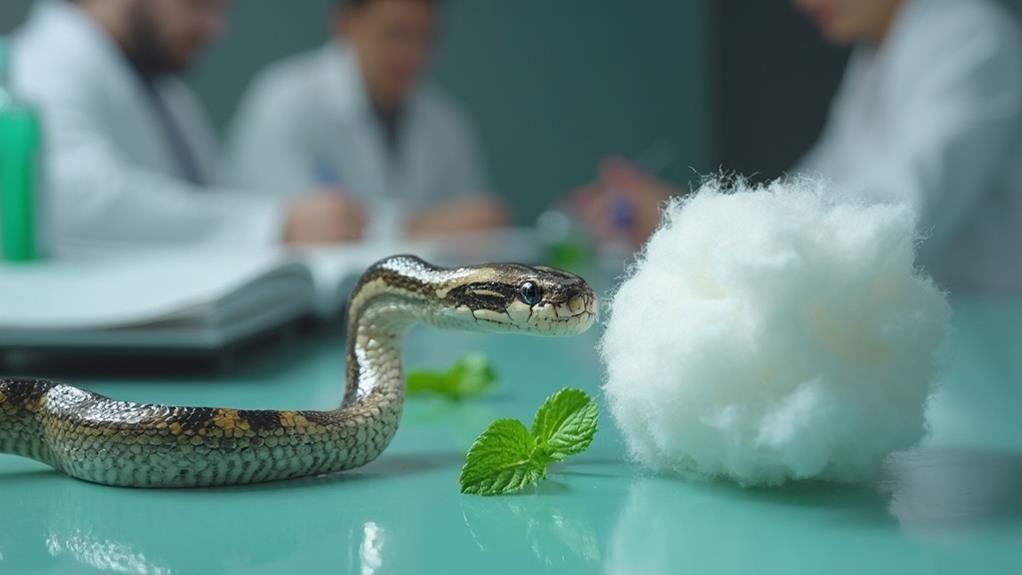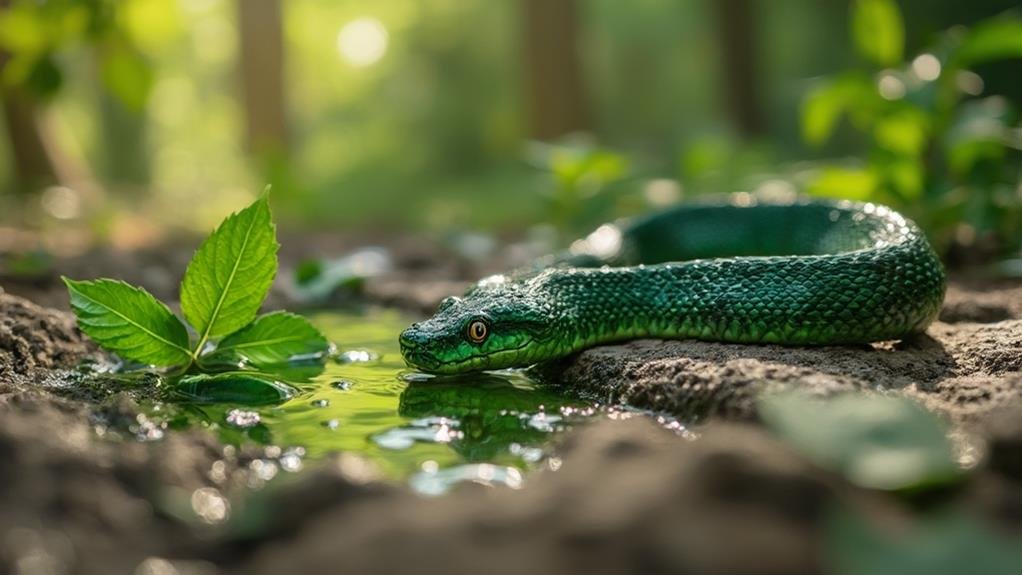Does Peppermint Oil Repel Snakes?
Yes, Peppermint oil can repel snakes. Snakes rely heavily on their sense of smell, and the strong aroma of peppermint oil is believed to irritate their sensitive olfactory system, causing them to avoid the area.
Snakes can be unwelcome visitors in our gardens or homes, and many people seek natural ways to deter them.
Peppermint oil is often touted as a natural snake repellent, but how effective is it really? Let’s dive into the science behind peppermint oil and its potential to keep snakes away.
Understanding Peppermint Oil

Peppermint oil is extracted from the peppermint plant and contains various compounds, primarily:
- Menthol: Creates the cooling sensation and may have pain-relieving properties.
- Menthone: Contributes to the characteristic minty aroma.
- Limonene: An antioxidant found in citrus fruits.
Peppermint oil is “lipophilic,” meaning it can easily penetrate cell membranes. This property might explain why it could affect the nervous systems of animals, including snakes. If you’re interested in how essential oils interact with different materials, you might want to explore how essential oils can stain wood.
How Snakes Smell
Snakes rely heavily on their sense of smell. They “taste” the air by flicking their tongues and transferring scent particles to the vomeronasal organ in the roof of their mouth. This organ helps them:
- Find prey
- Identify predators
- Locate mates
- Mark territory
Does Peppermint Oil Repel Snakes?

Peppermint oil is often touted as a natural repellent for various pests, including snakes. Its strong aroma is believed to deter snakes, as they have a highly sensitive sense of smell. However, the effectiveness can vary significantly from one snake species to another.
It’s important to remember that relying solely on peppermint oil for snake control may not be sufficient. Proper landscaping, removal of debris, and regular maintenance are crucial steps in minimizing snake presence in residential areas. You might also want to consider learning about the effectiveness of essential oils and their attraction to bears.
Using peppermint oil can be part of an integrated pest management approach but should not be the only strategy employed.
Key Considerations When Using Peppermint Oil
- Snake Species: Different species may react differently to peppermint oil.
- Oil Concentration: Higher concentrations might be more effective, but use caution as it can be irritating.
- Environmental Factors: Rain, heat, and sunlight can reduce the oil’s effectiveness outdoors, requiring reapplication.
Using Peppermint Oil Outdoors
If you want to try using peppermint oil as a snake deterrent outdoors:
- Perimeter Treatment: Spray or sprinkle diluted peppermint oil around the area you want to protect.
- Soil Absorption: Mix peppermint oil with water and spray it on the soil around plants and trees.
- Cotton Balls or Cloth: Soak cotton balls or cloth in peppermint oil and place them strategically.
Remember, reapplication may be necessary, especially after rain or heavy watering.
Peppermint Oil vs. Other Repellents

Let’s create a comparison table highlighting the key differences between peppermint oil, other natural repellents, and chemical-based repellents, focusing on aspects like effectiveness, safety, environmental impact, and cost.
Here’s the comparison chart highlighting the key differences between the various types of repellents:
| Repellent Type | Effectiveness | Safety | Environmental Impact | Cost |
|---|---|---|---|---|
| Peppermint Oil | May vary depending on snake species and concentration | Generally safe when diluted; can irritate skin and eyes | Minimal; biodegradable | Low |
| Other Natural Repellents (e.g., citronella, lemongrass) | Limited effectiveness; may repel some snake species | Generally safe; can cause skin irritation in some individuals | Minimal; biodegradable | Low to moderate |
| Chemical-Based Repellents | Often more effective but can vary | Potential toxicity to humans, pets, and the environment | Can harm beneficial insects and pollute water sources | Moderate to high |
Safety First!
- Skin and Eye Irritation: Peppermint oil can cause skin and eye irritation. Dilute it with a carrier oil like coconut oil and handle it with care.
- Keep Away from Children and Pets: Ingesting peppermint oil can be harmful. Store it out of reach.
- Ventilation: Use peppermint oil in well-ventilated areas to avoid respiratory problems.
Expert Opinions
Experts are divided on peppermint oil’s effectiveness. Some believe it may deter certain snake species, while others stress the need for more research.
The general consensus is that peppermint oil should not be your sole defense against snakes. Combining it with other preventative measures, such as sealing entry points and removing attractants, is crucial.
FAQs
- Can peppermint oil repel other pests? It might help repel rodents and some insects.
- Is it safe around pets and children? Use diluted peppermint oil with caution around pets and children.
- How often should I reapply it? Reapply every 2-3 days or after rain.
- Can I use it indoors? Its effectiveness indoors is uncertain.
Conclusion
While peppermint oil might help deter some snakes, its effectiveness is not guaranteed. If you choose to use it, consider it as part of a broader snake prevention strategy. Always prioritize safety and consult a professional if you have any concerns.







